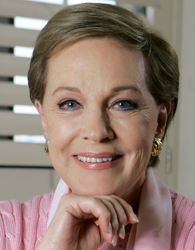Julie Andrews became famous as the star of Broadway’s “My Fair Lady” and “Camelot” and Hollywood’s “Mary Poppins,” “The Sound of Music” and “Victor/Victoria.” Also known as a children’s book author and tireless promoter of good works, her iconic, unforgettable characters and music are a legacy to several generations.
Julie Andrews’ Early Days
Born Julia Wells on October 1, 1935, in Walton-on-Thames, Surrey, England, Andrews lived her early years as the child of Ted and Barbara Wells. Her mother, Barbara Wells, was a pianist who ultimately left her first husband for Ted Andrews, a man Andrews referred to as “Pop,” and who was later revealed to be her true father.
Starting when she was nine years old, Andrews appeared on stage with her mother and stepfather, showcasing her remarkable singing voice. Even when she was very young, she had the pitch and range of an adult, a result of what doctors told her was a “mature larynx.”
As Andrews entered adolescence, her stepfather began to struggle with an alcohol addiction, and on several occasions he attempted to kiss or otherwise inappropriately interact with her, she wrote in her 2008 memoir, “Home: A Memoir of My Early Years.”
At 17, Andrews’ fame was skyrocketing and she was starring in productions at the London Palladium. In 1954, she was recruited by a Broadway producer to star in “The Boy Friend,” and from there she played a number of roles on Broadway, most notably that of Eliza Doolittle in the smash hit, “My Fair Lady.” Andrews received Tony nominations for her role in “My Fair Lady” (1956) and “Camelot” (1961).
Sources in this Story
- NPR: Julie Andrews: Making good after a miserable youth
- ABC News: Julie Andrews Finds ‘Home,’ New Voice in Revealing Memoir
- Academy of Achievement: Julie Andrews
- IMDb: Julie Andrews
- YouTube: Julie Andrews on The Muppet Show
- The Julie Andrews Collection
- Julie Andrews Online
- Herald Sun: Julie Andrews revives classic stage show My Fair Lady
Andrews’ Notable Accomplishments
After seeing her play Guinevere in “Camelot,” Disney representatives approached Andrews about a film role. She considered the offer to play the eccentric nanny, Mary Poppins, while pregnant with her first daughter, Emma, and accepted only after she lost the role of Eliza in the film version of “My Fair Lady” to Audrey Hepburn.
Her work as the title character in “Mary Poppins” made Andrews a darling of the critics. Her perky good looks, combined with her four-octave vocal range, set her apart from any other singing actresses of her time. She won the 1964 Best Actress Oscar for her first performance on screen, a feat rarely achieved.
She went on to star in “The Americanization of Emily,” and “The Sound of Music,” which, at the time of its release, was the most successful American film of all time. She was nominated for another Oscar for her role as Maria, and the film won the Best Picture Oscar, making Andrews one of the most marketable actresses in movie history.
Julie Andrews starred in several more films, and in 1972 she hosted her own variety television show on CBS that won seven Emmy awards, but still lasted only one season. More film work came in the 1970s and ’80s, including roles in two films produced by her husband Blake Edwards: “10” and “Victor/Victoria,” a gender-bending comedy that once again earned her critical acclaim. She continued in both stage and screen performances through the 1990s and in 2001, she played the role of the Queen in “Princess Diaries,” followed up with parts in “Princess Diaries 2,” “Shrek 2” and “Shrek the Third.”
Julie Andrews and Her Work
- Mary Poppins
- The Sound of Music
- Victor/Victoria
- The Princess Diaries
- Home: A Memoir of My Early Years
The Rest of the Story
Since 1971, Andrews has written children’s books, often collaborating with her daughter, Emma Walton. Her first book was “The Last of the Really Great Whangdoodles,” followed by her series of books about a dump truck. Recently Andrews and Walton were given their own imprint at HarperCollins Publishers.
Andrews also devotes much of her time to charitable work. In 1992, she was named the Goodwill Ambassador for the United Nations Development Fund for Women. She has worked with several other charities including Operation USA and UNICEF. In 2000, Andrews was made a Dame Commander of the British Empire by Queen Elizabeth II for her lifetime achievement in arts and humanities.
In 1995, she reprised her role in Victor/Victoria on Broadway, but her run was cut short by troubles with her voice. She underwent vocal-cord surgery, which she says was botched by the doctor. Andrews was briefly hospitalized for depression when it began to seem as if her musical gifts would be gone for good. But by 2001 she was singing again. In 2017, Andrews directed a revival of My Fair Lady in Melbourne, 60 years after the show originally opened.
This article was originally written by Jennifer Ferris; it was updated September 29, 2017.











